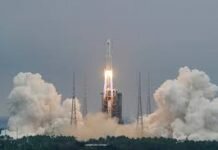
China launched a rover to Mars on Thursday, a journey coinciding with a similar US mission as the powers take their rivalry into deep space.
The US spacecraft due to lift off on July 30.
It is a crowded field. But the race to watch is between the United States and China, which has worked furiously to try and match Washington’s supremacy in space.
The Chinese mission is named Tianwen-1 (“Questions to Heaven”) in a nod to a classical poem that has verses about the cosmos.
Chinese authorities have yet to confirm the success of the launch.
Tianwen-1 is expected to arrive in February 2021 after a seven-month, 55-million-kilometre (34-million-mile) voyage.
The mission includes a Mars orbiter, a lander and a rover that will study the planet’s soil.
The United States has already sent four rovers to Mars since the late 1990s.
The next one, Perseverance, is an SUV-sized vehicle that will look for signs of ancient microbial life, and gather rock and soil samples with the goal of bringing them back to Earth on another mission in 2031.
After watching the United States and the Soviet Union lead the way during the Cold War, China has poured billions of dollars into its military-led space programme.
“China joining (the Mars race) will change the situation dominated by the US for half a century,” said Chen Lan, an independent analyst
China has made huge strides in the past decade, sending a human into space in 2003.
The Asian powerhouse has laid the groundwork to assemble a space station by 2022 and gain a permanent foothold in Earth orbit.
China has already sent two rovers to the Moon. With the second, China became the first country to make a successful soft landing on the far side.
The majority of the dozens of missions sent by the US, Russia, Europe, Japan and India to Mars since 1960 ended in failure.
Tianwen-1 is not China’s first attempt to go to Mars.
A previous mission with Russia in 2011 ended prematurely as the launch failed. Now, Beijing is trying on its own.
AFP














































